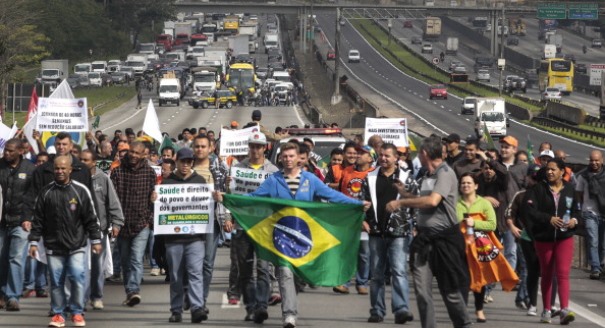Just before eleven o’clock on June 28, a well-dressed middle-aged man handed himself in to police in the center of Brasília. Natan Donadon had been a fugitive for twenty-four hours after Brazil’s highest court, the Supreme Federal Tribunal, had ordered his imprisonment a day earlier.
Donadon’s incarceration is a sign that the Brazilian government will take seriously the protests that swept the country last month. But Brasília will need to do much more to address popular grievances, not least in the run-up to next year’s soccer World Cup.
Donadon now languishes in one of Brazil’s notorious jails, the overcrowded Papuda penitentiary on the outskirts of the capital. The judge who signed Donadon’s detention order afforded the condemned man one concession. For the moment, the forty-five-year-old is in an individual cell and does not have to share with members of some of the world’s most brutal organized-crime syndicates.
That is unlikely to be much consolation for Donadon, who is Brazil’s first serving politician to see the inside of a prison cell since the promulgation of the country’s most recent constitution in 1988. Dozens of members of parliament, ministers, governors, and mayors have been arrested, tried, and sentenced, but none has been imprisoned.
Donadon was sentenced three years ago to thirteen years and four months for forming a criminal association and embezzling €2.8 million ($3.6 million) while serving in the Regional Assembly of the northern state of Rondônia between 1995 and 1998.
Until now, however, his conviction for these egregious crimes was no hindrance to his continued rise up the distinctly ungreasy pole of Brazilian politics. Had it not been for the protests that hit Brazil in June, Donadon would still be happily serving as a member of parliament in the federal Congress, representing the people of Rondônia from whom he stole all that cash.
The Donadon affair should be the first of many changes in Brazilian politics over the next year. June’s extraordinary demonstrations were a powerful political statement in themselves. The movement expressed the revulsion of Brazilian voters with the oligarchic structures that dominate Congress, political parties, and the economy.
But the timing of the protests was a stroke of luck for an embattled middle class demanding greater investment in health, education, and transport as well as a vigorous prosecution of high-level corruption. In coinciding with the FIFA Confederations Cup soccer tournament, hosted this year by Brazil, the demonstrators were able to make plain their ability to disrupt a major sporting event.
Brazil’s government and FIFA prepared the Confederations Cup as a dry run for next year’s World Cup. Beyond that, Rio de Janeiro will host the summer Olympic Games in 2016. These events were conceived as Brazil’s way of announcing itself as a major political and economic force on the global stage.
It is well-known that Brazilians love their football. But it turns out they love their right to education, health, and buses even more. When FIFA President Sepp Blatter and Brazilian President Dilma Rousseff opened the Confederations Cup in Brasília on June 15, they were roundly booed. At the demonstrations outside, there were several expletives directed toward Blatter and what one banner called the “FIFA mafia.” There is widespread disgust in Brazil at the many billions of reals that have been lavished on the stadium-building program required by FIFA.
The demonstrators’ realization that they have the capacity to disrupt a major sporting event conferred a unique focus on the Brazilian protests vis-à-vis those in Turkey or Egypt. The message to the government and the broader elite is clear: either you start delivering on our demands for investment in public services and corruption, or we will wreck the World Cup and possibly even the Olympics.
The clock is ticking for the authorities. Donadon’s arrest was the first sign that the government will respond seriously to the protest movement’s demands. Since then, Brasília has also backed down over bus fares, while some of the governments of Brazil’s 27 states have promised to review the deeply corrupt system for doling out bus operating licenses in urban areas.
But Rousseff and her government will have to do a lot more before next year (which is also a presidential-election year) if the country is to host a successful, uninterrupted World Cup. She is caught between a rock and a hard place at the moment because Brazil’s economy is sliding dangerously as the old monster of inflation is beginning to stir. The country’s huge mineral and agricultural companies are happy to see the weak real sustained as this boosts their exports, but it also places unwanted pressure on the public purse to respond to the demands from the street.
The highly diverse protest movement has found a way to apply irresistible pressure on the authorities. This is an opportunity for a country with immense economic potential but also hideously unequal income distribution to implement real, progressive change. Brazil’s government should seize that chance and show it is really listening.











